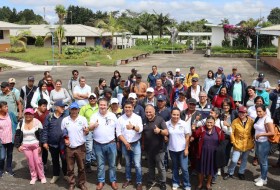News
Proyecto Biotransferencia supports cassava producers and processors in the southern region of Cauca.
The project, executed by the University of Cauca, delivered cassava seeds and seedlings in the first quarter of 2023 to producers in the northern and central regions of Cauca. In April, May, and June, the distribution extended to the municipalities of Rosas, El Tambo, Timbio, and El Patia, all of which are beneficiaries of the project.
The research team of the project "Consolidation of Knowledge and Technology Transfer Processes for the Production of Biodegradable Materials Developed in the Department of Cauca," known as Bio Transferencia, funded by the General Royalties System (SGR) and implemented by the University of Cauca through the CYTBIA and ANTROPOS research groups, is transferring knowledge and connecting cassava producers and processors in the Cauca department. The goal is to strengthen cultivation and improve the quality of the starch extraction process, ultimately ensuring a future supply of raw materials for large-scale production of biodegradable materials.
In this context, the Biotransferencia project provided cassava seeds and seedlings in the first quarter of 2023 to producers in the northern and central regions of Cauca. The distribution continued in April, May, and June to the municipalities of Rosas, El Tambo, Timbio, and El Patia, which are already project beneficiaries.
Hugo Portela Guarín, the project's director, emphasized the importance of training to empower cassava cultivation for both food and industrial uses, contributing to socio-economic improvements. Diana Niño, the leader of engagement and direct work with cassava producers, highlighted the significance of both seed distribution and knowledge transfer. She emphasized the ongoing support and guidance provided to producers in various agricultural processes, allowing knowledge to pass through generations.
The project team, actively engaging with producers in the field and inviting them to visit the university facilities, educates on seed multiplication through axillary buds, pest and disease control, and fertilization. This knowledge-sharing happens in collaboration with the Clayuca Corporation, a specialized organization in cassava cultivation in Colombia.
Continuing efforts to connect stakeholders in the value chain, the project explores cassava processing mills in the Cauca Department. Here, cassava is transformed into starch and flour, products used for both human and animal consumption (in cooking recipes, biomaterials, animal feed, etc.).
Fieldwork not only allows an appreciation for the agricultural effort and commercial value of the cassava but also strengthens good transformation practices. Currently, there is a focus on developing strategies for collaboration, exchange, and recognition among cassava processors in starch and flour production. The aim is to address issues related to pollution, water and energy consumption, and explore new business lines involving by-products such as sand, husk, fiber, and bran, which can be used as animal feed or fertilizer.
Claudia Maritza Gamboa, leader of engagement with processors, emphasized that this approach involves not only adopting good transformation practices but also studying environmental management and control to mitigate unfavorable impacts and comply with CRC regulations and guidelines.
In this way, the university demonstrates its presence and commitment to the department. The findings and results arising from academia aim to benefit and contribute to society.


